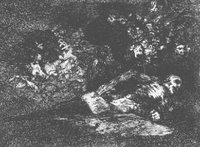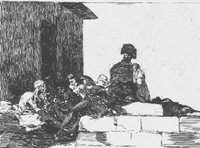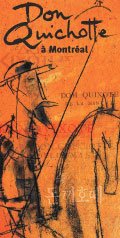
This exhibition celebrating 400 years of Don Quixote (401 years, now) ran at the
Bibliotheque nationale du Québec from
October 25 to December 31, 2005.
I squeezed in a visit last week. My mother was on her way home, J-F went in to work to get away from it all, my sister had to call in to her office — it seemed a good a time as any for me to take a breather and hit the library. To breathe Don Quixote, in the cold with a toddler cranky from the holiday upheaval of routine in a stroller on uncleared sidewalks.
I regret that I had not the time to write about this in time to encourage others to take in this show. I regret that I did not see it earlier in its run, leaving me time to revisit it, mentally and physically. I regret that the presence of the toddler distracted me from the details, which are really the point of an exhibit like this: A ton of books, to many indeed appearing to be the same book over and over again, in glass cases such that you can't turn them over in your hands, smell their age, flip pages, compare translated excerpts. Big deal. It's only in the lingering, examining the fine print, noticing their publication dates, appreciating advances in typography and book-binding, seeing the evolution of illustrations, evolution of the interpretation of literature's most-abiding character across time and space, that cases full of books, this one book, make any sense. (I've since managed to linger over it in my head, and it's starting to make sense.)
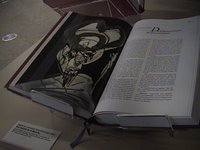
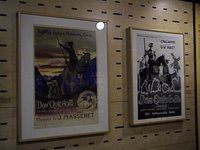 Don Quixote
Don Quixote having been translated into more than 70 languages and published in approximately 2500 different editions (according to the BNQ), the exhibit presents a sampling of those editions and other works inspired by the classic, along with posters for films and plays.
During its run were also featured screenings of film adaptations and lectures, none of which I was able to attend.
The volumes, courtesy of relatively local institutions (University of Laval, University of Ottawa, and Instituto Cervantes New York, among others), are predominantly French, Spanish, and English, but I detect a couple Polish translations, as well as Czech, Bulgarian (published 1947), Romanian (1957), Hebrew (1952), Indonesian (1949), and Japanese. (I wonder if the postwar period represents a surge in worldwide publishing of
Don Quixote, an effect of globalization of sorts and a sign of the spirit of the times. Or is it simply that books of this time period are better preserved, more readily available, maybe as objects simply nicer to look at?)
The smallest book on display looks to measure about 2 inches by 3, printed in London in 1749. A 1900 Japanese edition is similarly sized. The largest is about 10 inches by 14, with illustrations by Gustave Doré. Some books feature pullout maps (I love when books have maps! I said from
the start I wished my copy had a map). Many samples are obviously of multi-volume sets, adding to my
consternation that the Grossman translation, also on display, was published as a single volume.
Perhaps the oldest of the editions, showcased such as to appear to be the highlight of the exhibit, is a 2-volume set in Spanish, bearing the dates 1605 and 1615. I would assume these were original editions, but the information-bearing cards generally tell little beyond country of origin and the collection to which it belongs. Did I see an original? I don't know.
Well over a 100 "straight" editions are on display along with an additional dozen or so each of plays and adaptions, graphic novels, and children's versions.
I am stunned that in all the illustrations, Don Quixote is unmistakably Don Quixote, always gaunt and varying only slightly along the spectrum between foolishness and madness.
To my eyes, the most striking — vibrant and alive — illustration is one by Camille Dieuaide for a children's book,
Ce fou de Don Quichotte. (Although, the page in my memory, the one the book was open to within its glass case, access to which, in order to flip pages, was strictly denied, bears little resemblance to the cover of the work I managed to track down. Also, by this time I'd noticed signs prohibiting the taking of photographs, so I refrained from capturing any image that might serve as evidence.)
One of the bonuses of having a daycare-going toddler as my companion in arts is that she's been to this library before (I haven't) and knows its layout. Initially I see this as a drawback, as she is intent on dragging me to the kids' section to enjoy the multimedia stations, in completely the opposite direction of the exhibit for which I'd made the trip. Heavy negotiations ensue, with only minimal kicking and screaming. And we set out to explore the children's multimedia stations, because I'm not a very good negotiator and it was the only way to minimize the kicking and screaming. (It's only afterward that I managed to sway her toward the heart of the exhibit as described above.)
As it happens, this was a very good thing, because we came upon a gem:
Fanfreluche: Les Aventures de Don Quichotte.
Fanfreluche was a television production of Radio-Canada (I think) airing 1968—1971. It had regular airplay for years into J-F's childhood. Basically, there's a doll (played by an adult) who sits in a giant chair and reads stories out of a giant book, enters into discussions with the characters in the giant book, and enters the book itself. In J-F's words, "For a kids' show it was pretty fucked up."
So. Fanfreluche starts reading about the adventures of Don Quixote and before you know, along comes his horse, Rocinante, strumming a guitar, to warn Fanfreluche and any potential reader to close the book now, the text is dangerous! All these battles, the chivalry!, the romance! will turn your head! Don Quixote's a crazed lunatic, you don't want to cross his path! But Fanfreluche persists.
Enter Don Quixote, who mistakes Fanfreluche for his beloved Dulcinea. Fanfreluche tries to convince him otherwise, but he's having none of it, and he sings her praises above the din of her protestations. Rocinante meanwhile is trying to prevent the Don from getting any word in at all, all the time pleading with Fanfreluche to just close the damn book already.
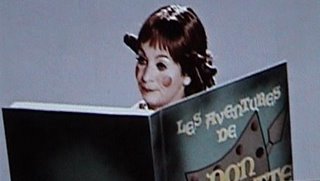

At least, that's what I get out of it with my crappy French before my toddler strongly insists I watch some crappy Disney movie with her. But that's a pretty awesome 10 minutes of quality postmodern television, awesome enough for me to forgive the kicking and screaming and the bloody stroller and the treacherous ice on the way there and the thick slush on the way home and the stupid escalator at the métro station being out of service, which are maybe why my shoulder's been hurting like hell this week.
And I bought myself a bookmark.
(
Summary of my
Don Quixote reading experience;
final thoughts.)
